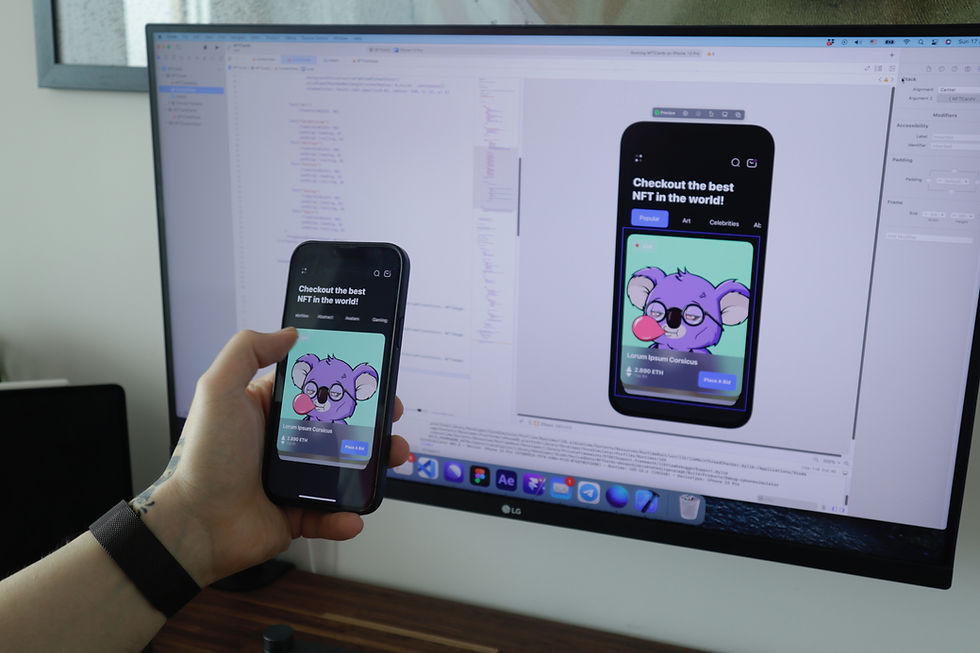Reasons for App Hangs in iOS and How to Fix Them
- May 22, 2023
- 3 min read

App hangs or freezes are common issues faced by iOS users and can be frustrating for both developers and users. An app hang occurs when an application becomes unresponsive for more than 250 milliseconds, leading to a poor user experience.
In this blog post, we will explore some common reasons for app hangs in iOS and discuss effective solutions to fix them.
Reasons for App Hangs in iOS
1. Long-Running Tasks on the Main Thread
The main thread in iOS is responsible for handling user interactions and updating the user interface. Performing long-running tasks on the main thread can cause the app to freeze and become unresponsive. Examples of long-running tasks include network requests, database operations, or complex computations.
Solution: Move long-running tasks to background threads using Grand Central Dispatch (GCD) or Operation Queues. By doing so, the main thread remains free to handle user interactions, ensuring a smooth user experience.
Here's an example using GCD
DispatchQueue.global(qos: .background).async {
// Perform your long-running task here
DispatchQueue.main.async {
// Update UI on the main thread if necessary
}
}
2. Excessive CPU or Memory Usage
If an app consumes excessive CPU or memory resources, it can lead to poor performance and potential app hangs. Memory leaks, retain cycles, or inefficient resource management are common causes of high resource usage.
Solution: Use Instruments, a powerful profiling tool in Xcode, to analyze and optimize your app's CPU and memory usage. Address any memory leaks, properly release resources, and optimize algorithms to reduce resource consumption.
3. UI Blocking Operations
Performing operations that block the main thread can cause the app to hang. For instance, synchronous network requests or disk I/O operations can lead to unresponsiveness.
Solution: Utilize asynchronous APIs and techniques to prevent blocking the main thread. For network requests, use frameworks like Alamofire or URLSession with completion handlers or async/await for async APIs. For disk I/O, employ background queues or DispatchQueue.async.
4. Deadlocks and Race Conditions
Deadlocks occur when multiple threads are waiting for each other to release resources, resulting in a complete halt. Race conditions arise when multiple threads access shared resources simultaneously, leading to unpredictable behavior and app hangs.
Solution: Use synchronization techniques like locks, semaphores, or dispatch barriers to handle shared resources safely. Carefully review and analyze your code for potential deadlocks and race conditions. Utilize tools like Thread Sanitizer in Xcode to detect and fix such issues.
5. Infinite Loops
An infinite loop occurs when a section of code keeps executing indefinitely, preventing the app from responding.
Solution: Thoroughly review your code for any infinite loops and ensure appropriate loop termination conditions are in place. Use breakpoints and debugging tools to identify and fix such issues during development.
Using APM Tools to Detect and Identify App Hangs
In addition to following the aforementioned solutions, leveraging APM tools can be immensely helpful in identifying and diagnosing the root cause of app hangs. Two popular APM tools for iOS are Firebase and Finotes.
1. Firebase Performance Monitoring
Firebase Performance Monitoring is a comprehensive APM tool provided by Google. It allows you to gain insights into your app's performance, including metrics related to app hangs, slow rendering, network requests, and more.
2. Finotes
Finotes is another powerful APM tool specifically designed for iOS and Android applications. It offers deep insights into app performance, including identifying bottlenecks, detecting crashes, and diagnosing app hangs.
Conclusion
App hangs in iOS can be caused by various factors such as long-running tasks on the main thread, excessive CPU or memory usage, UI blocking operations, deadlocks, race conditions, and infinite loops. By understanding these reasons and implementing the suggested solutions, you can significantly improve your app's responsiveness and provide a better user experience.
Additionally, by utilizing APM tools like Firebase and Finotes, you can detect and identify the root cause of app hangs more effectively. These tools offer detailed insights, performance metrics, and real-time monitoring to help you optimize your app's performance and address hang-related issues promptly.
Remember to test your app thoroughly on different devices and iOS versions to ensure its stability and responsiveness. Regularly profiling and optimizing your app's performance will help you catch and resolve potential hang issues early in the development cycle.
By following best practices, utilizing appropriate tools, and adopting efficient coding techniques, you can mitigate app hangs and deliver a seamless experience to iOS users.
Happy coding!



Comments